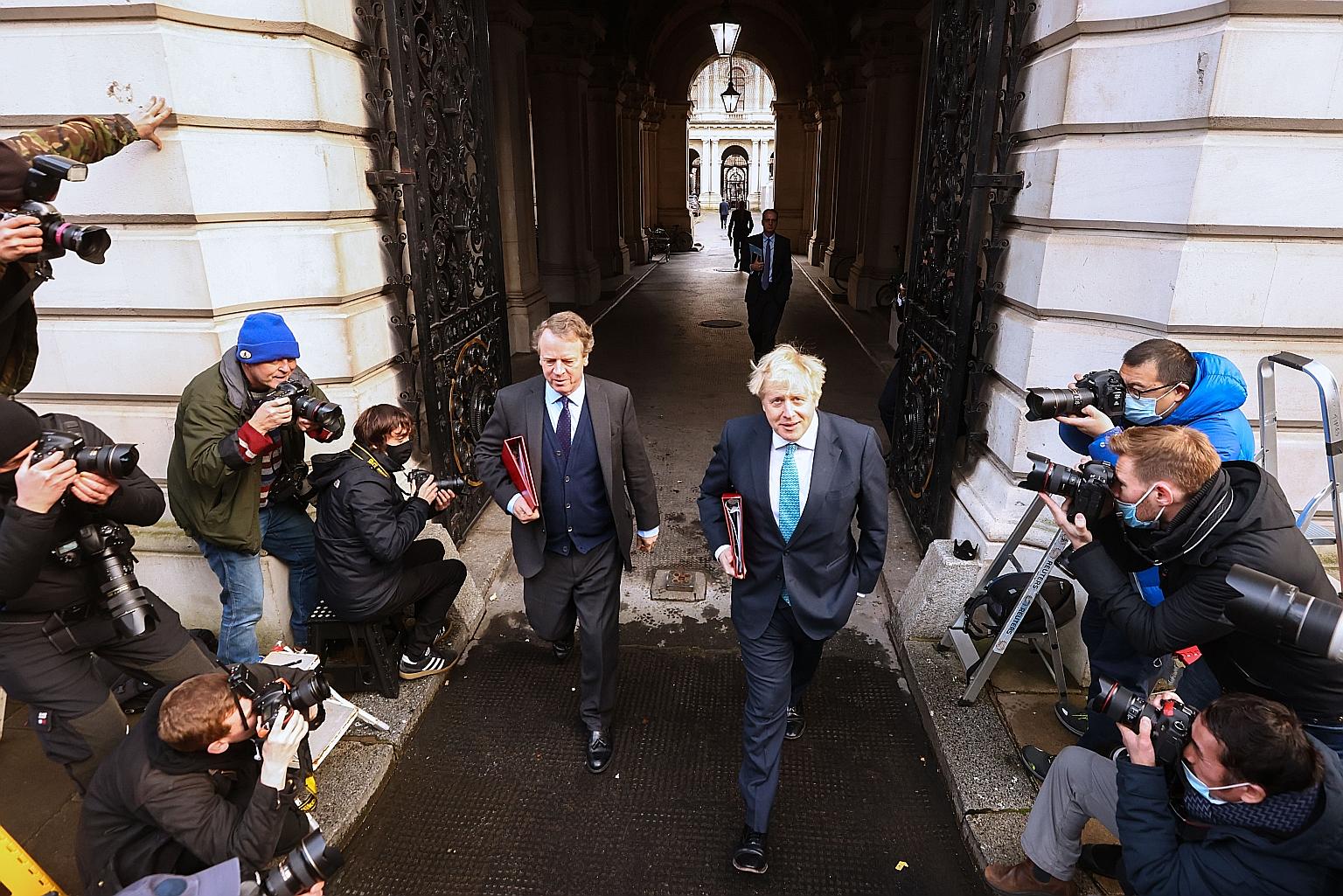British PM visiting India to strengthen ties
He will also invite India to join Group of Seven summit which Britain is hosting next year
Sign up now: Get ST's newsletters delivered to your inbox

British Prime Minister Boris Johnson (right) leaving a Cabinet meeting in London on Tuesday, with Mr Alister Jack, Secretary of State for Scotland. Mr Johnson will be visiting India next month.
PHOTO: BLOOMBERG
Follow topic:
LONDON • British Prime Minister Boris Johnson will travel to India next month in his first major bilateral visit to another country since taking power last year, his office has said, as the government eyes post-Brexit trade deals.
During the trip, Mr Johnson will invite India to join next year's Group of Seven summit, which Britain is hosting, as one of three guest countries, alongside South Korea and Australia.
The Indian trip is aimed at strengthening bilateral trade ties and investment, and cooperation in various areas including defence, security, health and climate change, his office said on Tuesday.
It will coincide with India's Republic Day celebrations on Jan 26, and come just weeks after Britain leaves the European Union single market on Dec 31, and as it seeks new trade deals post-Brexit.
"I am absolutely delighted to be visiting India next year at the start of an exciting year for Global Britain, and look forward to delivering the quantum leap in our bilateral relationship that Prime Minister (Narendra) Modi and I have pledged to achieve," Mr Johnson said in a statement.
"As a key player in the Indo-Pacific region, India is an increasingly indispensable partner for the UK as we work to boost jobs and growth (and) confront shared threats to our security."
Mr Johnson's planned trip follows an invitation from Mr Modi, who last weekend took part in a climate summit hosted by London, and its announcement comes as British Foreign Secretary Dominic Raab visited India on Tuesday.
"What we recognise (are) the possibilities for a deeper trading relationship, the contours of our economy I think would allow that," Mr Raab told a New Delhi news conference with his Indian counterpart S. Jaishankar. "We will want to nudge our trade ministers along and see what we can achieve."
Mr Jaishankar said there was "a very serious intent" to intensify the two countries' trade relationship. "We see the strategic case," he told reporters.
Britain left the EU on Jan 31 and is in a standstill transition period where the bloc's rules still apply until Dec 31, as it tries to secure a free-trade agreement.
But it has in recent months struck deals with a number of countries, including Japan and Singapore, as part of its post-Brexit "Global Britain" strategy.
As part of the plan, Britain announced on Tuesday that it had signed a trade deal with Mexico, with plans for a more substantial agreement next year.
"This deal supports a trading relationship worth more than £5 billion (S$9 billion) and locks in access to each other's markets," said British Trade Secretary Liz Truss.
"This is also the seventh trade deal we've secured with a member of CPTPP (Comprehensive and Progressive Agreement for Trans-Pacific Partnership), the grouping of 11 dynamic economies around the Pacific. So, it's another really important stepping stone towards the UK joining CPTPP," she added.
In India, Mr Raab said Britain had been "too myopically focused just on Europe" in the past, but could now look further afield.
"And certainly if you look at India and the Indo-Pacific region and take a long-term view, that is where the growth opportunities will be," he added.
Mr Johnson will be only the second British leader since India's independence from Britain to attend the annual Republic Day parade in New Delhi as guest of honour, after Mr John Major in 1993.
His office highlighted the two countries' burgeoning trade and investment link, which it said is worth £24 billion annually and supports more than half a million jobs.
It noted their increased cooperation during the coronavirus pandemic, with India's large pharmaceutical sector supplying more than half of the world's vaccines. At least a billion doses of Britain's Oxford-AstraZeneca vaccine are being manufactured at the Serum Institute in the Indian city of Pune.
AGENCE FRANCE-PRESSE

